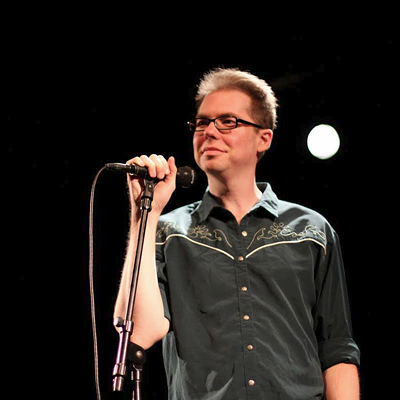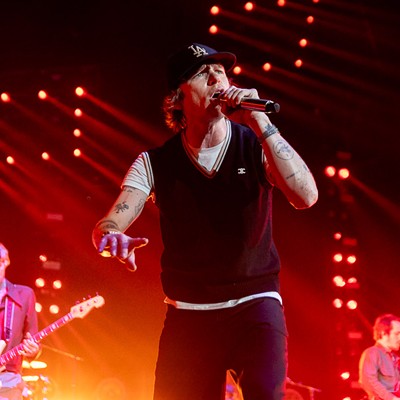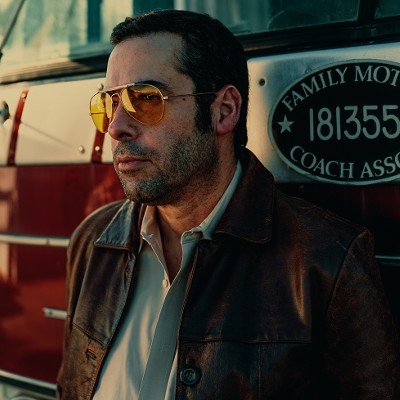Although it was upstaged by the Queen Elizabeth II/007 skydiving stunt, one of the lasting impressions from the 2012 opening ceremony of the London Olympics is what a big role British pop music has played in not just the UK's recent history but its national character. And tonight one of the UK's most talented musicians of our lifetime, Noel Gallagher, will perform at House of Blues with his latest group, High Flying Birds. ICYMI, Gallagher was the musical driving force behind Oasis while his younger brother Liam was its excessively brash mouthpiece, a fraternal friction that turned out to be a fantastic formula for a rock and roll band.
At their peak, Oasis was one of the best bands walking the planet, particularly to see live, something both Gallagher brothers would be the first to tell you themselves. (It was one of the few things they could agree on.) With their 1994 debut, Definitely Maybe, Oasis helped catalyze the burgeoning scene known as Britpop, an assortment of bands influenced by the very British likes of the Kinks, Paul Weller and the Stone Roses; when these groups stormed the charts in the mid-'90s, the collective burst of energy gave the UK's sagging spirits a real shot in the arm, musically and even economically. Britpop was brief, with an approximate lifespan of 1993 to '97 (especially '94 and '95), but it was also perhaps the last time that mostly guitar-based rock stood front and center on the world's pop stage. Shortly thereafter came the Spice Girls, boy bands, Britney and Xtina, American Idol, Autotune, more boy bands and...you get the picture, and it ain't pretty.
Ultimately the biggest band to come out of the UK in the '90s, Radiohead, had little to do with Britpop at all, either then or especially now. And the post-Britpop generation, made up of acts like Coldplay, Muse, Keane and Arctic Monkeys, has been quite a bit more successful stateside than their immediate ancestors, even as blue-eyed soul singers Amy Winehouse, Adele and Sam Smith have dominated the charts on both sides of the Atlantic. Still, there's something about '90s Britpop that just won't go away – it's like a novel packed with so many vivid characters that you can't help reading it over and over again.
BLUR
Then: With ambition to burn and more than enough talent to satisfy their ravenous musical appetite, Damon Albarn’s Blur were the well-heeled London yin to Oasis’s working-class Manchester yang, making for many a tasty tabloid feud. The three albums starting with 1993’s Modern Life Is Rubbish captured their specific time and place as good as or better than any other band in rock history; for an encore, Blur became one of America’s unlikeliest one-hit wonders ever with “Song 2.”
Now: The band’s first studio album in 13 years, this year’s The Magic Whip, bears little resemblance to The Great Escape or Parklife but is still an excellent album, and still unmistakably Blur.
THE BOO RADLEYS
Then: A holdover from one of the scenes that dominated UK music immediately before Britpop, the shoegazers, this Liverpool trio named after the To Kill a Mockingbird character found that the public's tastes were right in line with their evolution into more of a pop group. That was enough to give them their only No. 1 album, 1995's Wake Up; its semi-title track “Wake Up Boo!” also hit the Top 10.
Now: Never made it out of the '90s, breaking up not long after releasing 1998's Kingsize.
ELASTICA
Then: A welcome bit of feminine energy in one of the most testosterone-mad music scenes this side of early-00s U.S. nu-metal, Elastica was arty and accessible. Their Wire-influenced songs – which came fast and furious on Elastica's eponymous 1995 debut – had just enough abrasive edge to break the skin, while singer Justine Frischmann's perfectly aloof demeanor belied how catchy the songs were; without her vocals, they would have been too sweet.
Now: Currently the name of a new Silicon Valley “cloud-security” startup. As for the band, Frischmann quietly slipped away after 2000's virtually ignored – and, according to Pitchfork, criminally underrated – The Menace, and is now a painter outside San Francisco.
THE LONDON SUEDE
Then: Britpop’s standard-bearers just before the rise of Blur and Oasis, when they were simply known as Suede, Brett Anderson and Bernard Butler’s bunch were the glammiest rockers this side of Ziggy Stardust and the Spiders From Mars, only ditching the space-oddity stuff for crushed-velvet frock coats and shirts open to the waist. Butler left after 1994 sophomore album Dog Man Star, arguably the band’s high-water mark, but Anderson gamely soldiered on as Suede steadily lost commercial traction until dissolving (ironically) after 2002’s A New Morning.
Now: Still kickin’. After a decade-long dry spell, Suede returned with 2013’s Bloodsports, that same sky-punching guitar sound now tempered by a new maturity.
MANIC STREET PREACHERS
Then: Eccentric, politically charged Welsh band whose hyperintelligent hard rock makes them a sort of UK answer to Queens of the Stone Age. Dating all the way back to 1986, the Manics only got caught up in the Britpop mania more or less because their 1996 masterpiece Everything Must Go conquered critics’ polls and cleaned up at the cash register — everywhere except the U.S., that is.
Now: Going strong. After a handful of U.S. dates this spring (nowhere near Houston, of course), playing a few more UK dates in a few weeks and two festivals later in the summer.
OASIS
Then: With songs as exciting and anthemic as any the ‘90s had to offer, the Gallagher brothers and their henchmen lived every word of the first song on Definitely Maybe, “Rock N’ Roll Star,” to the hilt. Even when chinks began appearing in their armor upon third album Be Here Now — said to be one of the most drug-fueled records of all time — Oasis remained one of Britain’s biggest bands straight through 2008’s Don’t Believe the Truth, their final album (so far) that also happens to be one of their best.
Now: As they usually are, rumors of a reunion have been trending lately. It'll happen before the Smiths get back together, at least.
PULP
Then: class-conscious art-pop bunch whose “Common People” swept the nation in 1995 and whose leader, Jarvis Cocker, was all but knighted after rushing the stage during Michael Jackson's acceptance speech at the 1996 Brit Awards. Their most recent album is 2001's We Love Life.
Now: Pulp reunited in 2011, albeit mostly for festivals here and there, but did release the single “After You” the next year. Cocker lives in Paris and hosts Jarvis Cocker's Sunday Service on BBC Radio 6; he was also the lead singer of the Weird Sisters in the film version of Harry Potter and the Goblet of Fire.
SUPERGRASS
Then: Fueled largely by teenage lust run amok, at least at first, Supergrass’ relentless power-pop and Monkees-ish image could have easily pigeonholed the trio as bigger Britpop bands’ lovable kid brothers. But they were much more talented than that, which became clear almost immediately as Supergrass went on to enjoy a healthy career.
Now: Played their final show in Paris in June 2010. No reunion yet.
THE VERVE
Then: At first combining space-rock with more conventional Beatlesque pop on 1993 debut A Storm In Heaven, The Verve reined in their more extreme psychedelic impulses in favor of lighter-waving melancholia for two more essential Britpop albums, A Northern Soul and Urban Hymns; the latter is one of the 20 top-selling albums in UK history. If “Bitter Sweet Symphony” still turns you off, try “Lucky Man” or “The Drugs Don’t Work” instead.
Now: With nowhere to go but down after the ubiquitous “Symphony,” that’s exactly what The Verve did. They got their shit together in time to record 2008’s Forth, but have been largely dormant since then.
Noel Gallagher's High Flying Birds performs tonight at House of Blues, 1204 Caroline. Doors open at 8 p.m.
Support Us
Houston's independent source of
local news and culture
account
- Welcome,
Insider - Login
- My Account
- My Newsletters
- Contribute
- Contact Us
- Sign out
[
{
"name": "Related Stories / Support Us Combo",
"component": "11591218",
"insertPoint": "4",
"requiredCountToDisplay": "4"
},{
"name": "Air - Billboard - Inline Content",
"component": "11591214",
"insertPoint": "2/3",
"requiredCountToDisplay": "7"
},{
"name": "R1 - Beta - Mobile Only",
"component": "12287027",
"insertPoint": "8",
"requiredCountToDisplay": "8"
},{
"name": "Air - MediumRectangle - Inline Content - Mobile Display Size 2",
"component": "11591215",
"insertPoint": "12",
"requiredCountToDisplay": "12"
},{
"name": "Air - MediumRectangle - Inline Content - Mobile Display Size 2",
"component": "11591215",
"insertPoint": "4th",
"startingPoint": "16",
"requiredCountToDisplay": "12"
}
,{
"name": "RevContent - In Article",
"component": "12527128",
"insertPoint": "3/5",
"requiredCountToDisplay": "5"
}
]
KEEP THE HOUSTON PRESS FREE...
Since we started the Houston Press, it has been defined as the free, independent voice of Houston, and we'd like to keep it that way. With local media under siege, it's more important than ever for us to rally support behind funding our local journalism. You can help by participating in our "I Support" program, allowing us to keep offering readers access to our incisive coverage of local news, food and culture with no paywalls.
Chris Gray has been Music Editor for the Houston Press since 2008. He is the proud father of a Beatles-loving toddler named Oliver.
Contact:
Chris Gray
Trending Music
- Fuerza Regida Fires Up The Crowd at Toyota Center
- Cage the Elephant, Young the Giant Deliver Show Of the Summer at Woodlands Pavilion
- Top 10 Butt-Rock Bands of All Time
-
Sponsored Content From: [%sponsoredBy%]
[%title%]

Don't Miss Out
SIGN UP for the latest
Music
news, free stuff and more!
Become a member to support the independent voice of Houston
and help keep the future of the Houston Press FREE
Use of this website constitutes acceptance of our
terms of use,
our cookies policy, and our
privacy policy
The Houston Press may earn a portion of sales from products & services purchased through links on our site from our
affiliate partners.
©2024
Houston Press, LP. All rights reserved.





